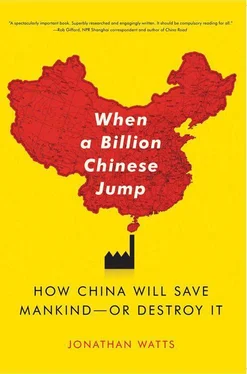He insisted he was a public servant first and an entrepreneur second, but if it was possible to combine the two, why not? Money was one of the best incentives for change known to man. As I was about to leave, Wang opened a huge bag of sunflower seeds and invited me to tuck in. “Before you go, I just want to sketch out for you my design for new solar-heating panels,” he said. “We have a good thing going here. But we need more foreign investment. Could you be a matchmaker for me?”
I would have liked to help. International cooperation and business incentives will be essential if the world is to descend safely from the peak of fossil-fuel consumption. In global climate-change talks, China’s focus is on technology transfer. It wants rich, advanced countries to share or release patents on cutting-edge equipment, materials, and know-how that will improve energy efficiency and reduce pollution. Europe, however, puts a priority on economic incentives for the reduction of emissions of carbon and other greenhouse gases. The United States has tended to take a more market-oriented approach by letting fuel prices rise. 27This essentially shows each system playing to what it considers its strengths. Europe’s proposed solution is politically managed, China’s technical, and the U.S. economic. If they cannot find the right balance between their different outlooks and interests, there is a danger that competition to consume resources will surpass cooperation to conserve them. This will not just manifest itself in a hotter, more hostile global climate. It will probably lead to a darker, more belligerent world.
In the border city of Dandong, southeast of Shenyang, I had no need to imagine a planet without energy—I could see this dark alternative future simply by glancing across the Yalu River. On the other side was North Korea, one of the few nations in the world that had slid backward, that had deindustrialized. The difference with China was staggeringly evident at night, when the opposite bank of the river was cloaked in an inky blackness, while the Chinese side was a blaze of multicolored neon, amber streetlamps, car headlights, and illuminated advertising billboards. The Friendship Bridge spanning the river was decked out with fairy lights that pulsed red, green, and purple. But they stopped halfway across. The Korean half of the bridge was black even though it was just a short distance from Sinuju, the second-biggest city in North Korea. The same was true on a national scale. Satellite images of northeast Asia by night showed China, South Korea, and Japan sparkling with broad clusters of urban lighting, while dark North Korea stared out from the middle like a black pupil in the white of an eye. 28
This was not always the case. In 1970, Pyongyang was one of the most developed cities in Asia. The nation’s economy was bigger than that of South Korea. It stagnated, along with much of the former Eastern Bloc, during the 1980s, then slipped into reverse in 1989, when the Soviet Union broke up and stopped providing cheap oil. With few energy supplies of its own, North Korea’s industry collapsed, agricultural production plummeted, and an isolated government plowed what little budget it had into the military. 29By the mid-1990s, millions were starving. Estimates of how many died in the famine range from tens of thousands to more than a million. The biggest operation in the history of the UN World Food Programme eased the food crisis, but energy remains scarce.
To avoid such a future in China and elsewhere, leaders need to prepare for the day when the fossil-fuel tap runs dry. Unless consumer habits change dramatically or technology makes a quantum leap, there might yet come a point when drastic North Korean–style belt-tightening becomes necessary everywhere.
Eco-cities and green buildings could help to allay this risk. But they will not solve China’s problems unless similar measures are taken in the countryside, where the majority of China’s population live. 30The average income of the 740 million rural dwellers is 30 percent of that in the city, but farmers are still far richer than ten years earlier. As they buy more household appliances, bigger television sets, and cars, Chinese country folk are gobbling up more of the world’s food, energy, and raw materials. Although farmers have traditionally been more conscious of recycling, their modern consumption habits are potentially more damaging because, in the countryside, it is harder to make efficiency gains through public transport usage, concentrated power generation, and shared waste treatment. The agricultural workforce was traveling more, migrating to the cities in search of work, returning for harvests and spring festival. As we saw in Huaxi, the Number One Village in China (chapter 6), village economies are also moving into new areas such as mining, food processing, and manufacturing.
The government would like to make rural lifestyles more sustainable. In the snow-clad hills of Liaoning, officials have collaborated with a local entrepreneur and foreign architects to try to create a model sustainable village. But, as I quickly found out, the results from this marriage of technology and business are anything but encouraging.
The taxi driver insisted we pay 20 yuan extra to go to Huangbaiyu, or “Yellow Cyprus Valley,” because the roads were so bad she would have to drive more slowly than usual. Initially, I suspected she was exaggerating to talk up the fare. But after an hour winding along icy, bumpy, hilly roads, I realized she had been generous. She was also free with advice. Assuming we were foreign investors, she warned us not to waste our money. “Many people in this area will cheat you, so be careful. They promise good returns on all sorts of schemes, but the economy is so bad that most people lose out.”
It was a sobering introduction to Huangbaiyu, where a great deal of time, money, and political capital had been invested in what was touted as China’s first sustainable village. With the support of Deng Nan, the daughter of former paramount leader Deng Xiaoping, and financial and technical backing from the United States, a local tycoon had constructed forty modern, environmentally friendly homes at a cost of 8 million yuan. 31Unlike the average Liaoning farm cottage, they were, in theory at least, built with renewable materials, thickly insulated, and powered by biogas. They even had their own wastewater treatment facilities. As the first fruit of the China-U.S. Center for Sustainable Development, Huangbaiyu was initially touted in 2004 as a shining example of international cooperation on the environment. But nobody was boasting about the project anymore. In fact, local officials and businessmen seemed suspiciously reluctant to talk about it at all. Although I applied for interviews weeks in advance, they all insisted they were too busy to see me.
The reason for the reticence became clear as soon as I arrived. Two years after completion, the eco-village was virtually empty. Locals complained the new homes were overpriced and poorly built. The only two residents told me they had moved in under duress. They had no tap water, their ceilings leaked, and they had to cut down trees for fuel because the biogas supply was not working. The developer was so short of cash that he had been forced to sell his entire holding. Locals said the new owner planned to use the eco-village to house workers at a new bronze and iron mine that would soon be carved into the nearby hills. All in all, the project was a disaster.
“There is nothing good about it,” said Li Qinghong, one of the two disgruntled residents. “I only moved in because my old home burned down and the authorities told me I would not get any compensation unless I resettled here. I much preferred my old home. It had more space and was built better. In this place, they skimped on construction. The materials provided by the U.S. never got used.”
Читать дальше










